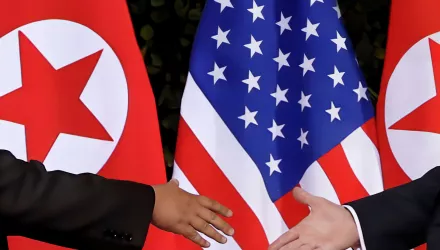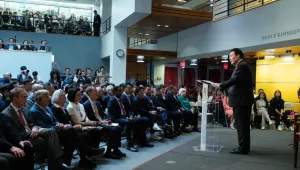The current North Korean nuclear crisis is not simply the problem of Pyongyang, nor is it solely the responsibility of regional powers. The U.N. is also accountable for the present status of the crisis. Assuming office in 2007, the new U.N. Secretary-General, South Korean Ban Ki-moon, offers some hope for the U.N. to reactivate its diplomacy in bringing lasting peace to the Korean Peninsula.
Today few people remember that the Korean War marked the first time that U.N. members acted collectively to intervene in a war, albeit under American leadership. For the five decades since then, North Korea has felt insecure by the perceived potential nuclear threat of the remaining U.S. military presence in South Korea.
The de facto nuclear protection given to both South Korea and Japan is one claimed rationale behind the North’s nuclear ambitions. U.N. Secretary-General Trygve Lie resigned after the Korean War, and history has yet to tell whether the U.N. successfully played its peace guardian role endowed by the Charter.
Since 1993, the U.N. has reacted to the North Korean nuclear issue mainly through Security Council resolutions. But the resolutions did not offer credible deterrent — only sanctions — neither did they address North Korea’s concerns.
Pyongyang rejected the resolutions as interference in its internal affairs and refused to recognize any ruling made by the U.N. Security Council. In addition, the former Special Advisor to Secretary-General Kofi Annan on North Korea, Maurice Strong, achieved little before he resigned during the oil-for-food scandal.
It is time for the U.N. to energize its diplomacy to help bring about a peaceful and lasting solution to the North Korean nuclear issue. The U.N.’s role on the Korean Peninsula could be two-fold. First, the secretary-general should use his good offices to help reinvigorate the six-party talks that had been stalled for more than a year and were resumed only recently with little substantive progress achieved so far.
A powerful injection of impetus by the international authority would help push the negotiations. Second, the secretary-general should promote necessary institutional coordination and planning in seeking a comprehensive solution to the problem. The North Korean nuclear issue is not an isolated case of proliferation but is related to a wide range of problems including humanitarian assistance, refugees, energy, and geopolitics.
Secretary-General Kofi Annan pointed out in 2003 that one of the top crises in the world that had been neglected by the international community was the severe famine in North Korea. Only the U.N. enjoys the unique authority to mobilize and coordinate international resources, as well as balance and compromise between difference political interests.
The secretary-general should also support a non-confrontational approach to North Korea. When considering the tools the U.N. has at its disposal, it should not narrowly focus on coercive means. Sanctions risk an escalation of tension between North Korea and the rest of the world. Repulsion of sanctions could render the U.N. ineffective, while incentives such as addressing the concerns that incite proliferation would be helpful.
In the case of North Korea, development of a collective security assurance could be the key, particularly when the military option is still on the table.
Fifty years ago, the U.N. under the domination of one power participated in a war that engulfed the Korean Peninsula. Currently, the nuclear imbroglio and the undercurrent of conflict there provide the U.N. an opportunity to write a new chapter on its role on the peninsula after a lapse of fifty years.
The U.N. may not take the lead in solving the North Korea nuclear crisis because the six-party talks facilitated by China remain the best channel, but the U.N. should not lose its podium. As the new U.N. Secretary-General, Mr. Ban Ki-moon, is not meant to represent any one region more than another, but hopefully he will inject new hope into the Korean Peninsula conflict.
Anne Wu is a fellow with the Belfer Center for Science and International Affairs at Harvard’s Kennedy School of Government.
Wu, Xiaohui (Anne). “UN's Moment for Peaceful Korean Peninsula.” The Korea Times, January 10, 2007




